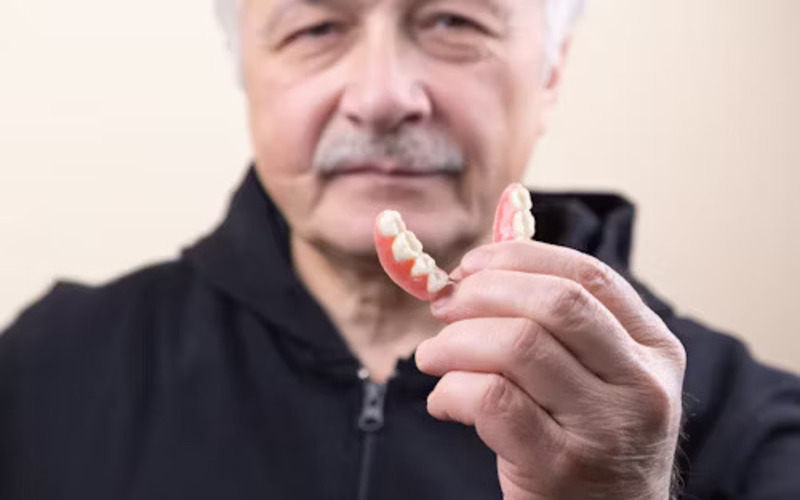Foods to Avoid and Enjoy With Your New Dentures

Congratulations on getting yourself new dentures! Indeed, you couldn’t have made a better decision for your dental (and psychological) health. You can now go ahead and grin with confidence, speak charismatically, and eat pretty much anything you like.
Well, hold on a minute. While dentures improve chewing function, they come with some adjustments regarding what you can and cannot eat.
Read below as we highlight the foods to eat and avoid after getting new dentures.
Foods to Avoid
One of the quickest ways to find a denture clinic in New Jersey is by looking it up online. Simply enter a relevant search term like ‘dentures near me,’ and your search engine will pull up dozens of reputable clinics within your locality.
After getting your dentures professionally fitted, your prosthodontist will recommend a series of foods to eat and those to avoid. Common foods to avoid include:
1. Hard or Crunchy Snacks
If you’ve just had new dentures, putting hard snacks in abeyance is best. These include nuts (peanuts, cashew nuts, macadamias, etc.), whole grains like popcorn, and corn chips.
Chewing on these snacks can put undue pressure on your dentures and potentially cause them to fracture.
2. Tough Meats
A serving of the good, old beef is undeniably appetizing. However, the pressure required to grind meat can cause your dentures to shift erratically, eventually becoming loose.
If you must eat meat, ensure it’s finely chopped and tenderly cooked.
3. Sticky Foods

Photo Credit: Unsplash.com
Indulging your sweet tooth after getting new dentures isn’t a great idea, and it’s not only due to the high sugar levels in many confectionery products.
Sticky candies can inadvertently dislodge your dentures. Their high sugar content may also erode the dentures and what’s left of your natural teeth.
Sticky sauces are no different, either. Besides presenting the above dangers, such sauces can also be difficult to clean off your dentures. They may build up over time, predisposing you to cavities and tooth decay.
4. Caffeinated and Carbonated Drinks
Can’t you enter a new day without a cup of the good, old coffee?
While coffee boasts numerous therapeutic properties, you may want to cut back on it if you’ve just gotten new dentures. Coffee contains natural pigments that can stain your dentures over time.
Carbonated drinks are even worse. These beverages are often laced with additives that may cause teeth discoloration. Besides, their high acidity can irritate your sensitive gums.
Instead, opt for decaffeinated drinks and unsweetened beverages.
5. Hot Beverages
Whether it's herbal tea, instant gravy, or just plain water, it doesn't matter! Hot beverages can burn your gum and make it challenging to have your dentures on.
Therefore, allow each drink to cool before consuming it.
If you’re unsure if a beverage is safe for drinking (since dentures serve as a barrier between the drink and your mouth), consider using a straw.
6. Citrus Fruits
Citrus fruits are loaded with vitamin C, one of the most potent antioxidant vitamins. Unfortunately, these fruits are also highly acidic.
Like fizzy drinks, citrus fruits can irritate your gums and make dentures unbearably uncomfortable to wear.
The best way to consume citrus fruits after getting new dentures is to blend them and drink the juice using a straw.
Foods to Prioritize
As you may have gathered, the best foods to consume after getting new dentures must be soft, non-sticky, mildly acidic, and cool enough. Excellent recommendations include;
1. Mashed or Steamed Vegetables
Vegetables are rich in essential nutrients, including minerals and vitamins. But for new denture wearers, preparation is key.
Experts recommend mashing your vegetables and then steaming or boiling them. Cook the vegetables long enough to soften them while keeping their nutrients intact.
Additionally, insist on nutritious options, like those in the cruciferous family.
2. Ground Meat
Getting new dentures doesn’t mean bidding farewell to meat. You don’t have to slice meat off your diet, provided it’s properly cooked.
First, invest in the ground instead of chopped meats.
Then, prepare the meat in a slow-cooking oven or pressure cooker. Either option helps tenderize your meat without having it lose its flavor.
3. Whole Grain Bread
Whole grain bread is higher in dietary fiber and lower in sugar than regular white bread. Just ensure the bread is soft enough.
You can remove the crusting if need be.
Alternatively, dip the bread in a nutritious, non-acidic and non-spicy salad to soften it. This way, you can down the bread whole without chewing it.
4. Boiled Soybeans

Photo Credit: Unsplash.com
Soybeans are remarkably high in protein, making them a great recommendation for vegans. However, how you prepare these legumes can determine whether you actually unlock their health and dietary benefits.
The decision on the best cooking method is particularly important if you’ve just gotten new dentures. The conventional wisdom is to boil soybeans until they’re soft enough to chew with minimal pressure. That applies to any other legumes.
Another excellent option is to consume softer soy derivatives like soymilk and tofu.
Wrap Up
Eating the right foods can help keep your new dentures intact and prevent severe injuries or discomfort to your jaws. However, dietary adjustments mean nothing if your dentures aren’t professionally fixed. That underscores the imperative of working with a licensed and accredited dental clinic.
Research a dentist carefully by reading through testimonials from their previous clients. After getting new dentures, ensure they remain in place and feel comfortable when you eat, talk, and smile. That said, if you happen to be in Mercer and Essex Counties, including Hamilton, East Orange, Robbinsville, Bordentown, Lawrenceville, Elizabeth, Trenton, and Newark, New Jersey, as well as the nearby cities of Orange, South Orange, West Orange, and Irvington, Dr. Thind has a wealth of experience assisting patients with their denture needs.
Dr. Thind creates comfortable, long-lasting, and natural-looking dentures and partials using cutting-edge materials.
Similar Articles
Who says you need deep pockets to enjoy mouth-watering meals? Eating like royalty doesn’t mean booking fancy restaurants or spending a fortune on gourmet ingredients
Learn how modern cafeterias balance taste and nutrition with fresh, flavorful, and healthy meal options tailored to diverse dietary needs and employee well-being.
Learn how digital menu boards revolutionize restaurants with dynamic content, eco-friendly updates, enhanced customer experiences, and streamlined operations.
In today’s fast-paced world, many people seek healthier eating methods without compromising taste or quality. One of the most popular approaches to achieving this balance is low-carb eating. This lifestyle helps manage weight, improve overall health, and keep energy levels consistent throughout the day
Discover the cutting-edge technologies, from cryogenics to AI, that revolutionize food transportation, ensuring freshness and sustainability across the globe.
Create a magical candy buffet for any event! Discover tips on candy selection, estimating quantities, creative theming, and ensuring dietary considerations.
Discover essential tips for selecting the ideal food canning machine. Learn key factors that ensure quality, efficiency, and long-term value for your needs.
Discover the future of functional and aesthetic design with electroplating glass bottles, enhancing durability and beauty for innovative packaging solutions.
Discover the top 6 snacks to elevate your 4th of July celebration with flavors that will delight your guests and add a festive touch to your party!









